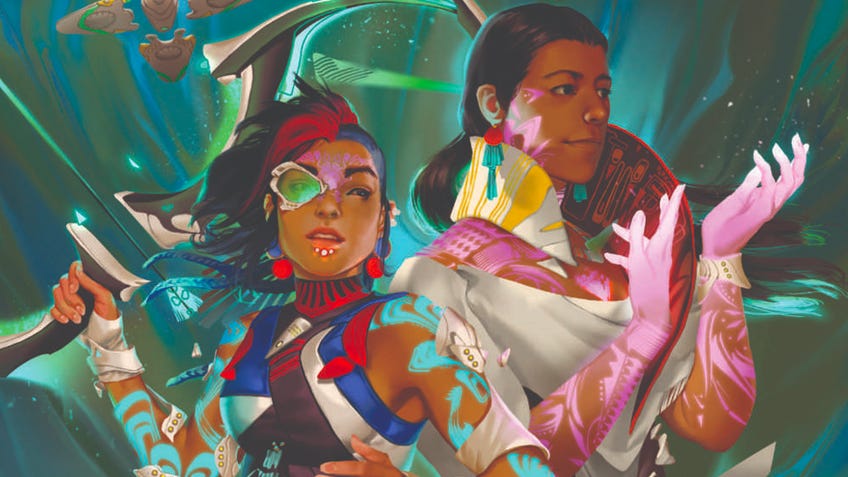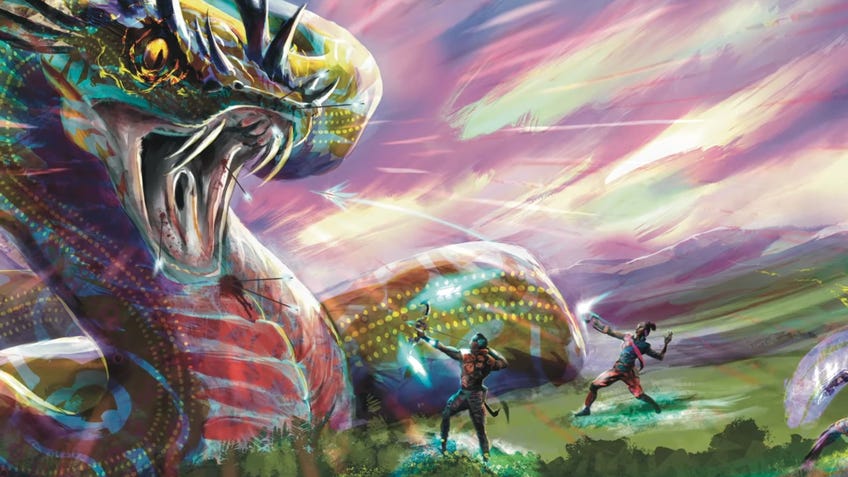Coyote & Crow is ready to expand its indigenous science-fantasy world beyond the tabletop RPG
A new bundle of adventures, card game and other projects open space for fresh voices to tell stories in their own way.
After earning over $1 million during its crowdfunding run on Kickstarter, the indigenous-created and focused tabletop RPG Coyote & Crow is prepared to tackle some major growing pains ahead of its newest project.
Lead designer Connor Alexander, a Cherokee creator based in Seattle, recently launched a campaign on Backerkit for a collection of adventures fully written by indigenous voices called Stories of the Free Lands. There’s also Naasii, a standalone, push-your-luck dice game pulled from the pages of Coyote & Crow’s sourcebook.
Alexander told Dicebreaker in an interview that Stories of the Free Lands won’t necessarily be “Native stories” in the sense that tabletop’s largely white and Western playerbase might expect. The ten writers whose stories will fill two separate volumes were given creative leeway to write murder mysteries, detective stories, noir, political intrigue and anything else that spoke to their heart. Alexander wanted pulpy genre fiction that indigenous voices don’t often get to tell without also being pigeon-holed by their cultural backgrounds.
“I look at a city like Kahokia and the game that the core RPG focuses on, and I think about New York or a city out of Blade Runner in a near future where you have all of these millions of people with really cool stories to be told,” the designer said. “They don't have to be just about monsters and ghosts. They can be about all kinds of stuff.”
Players should still expect a distinctive take on well-established science fantasy tropes when playing through Stories of the Free Lands’ adventures. Alexander likens them to the best episodes of The X-Files - “a healthy scepticism mixed with science-meeting-magic in a grey area” that gives rise to some truly unique narratives and expands the world of Coyote & Crow, both literally and thematically.
Branching out from behind the GM screen and character sheets was always the plan, but launching a business off a single product - no matter how successful - leaves you open to all kinds of chaos, according to Alexander. Producing and shipping Coyote & Crow throughout the first half of 2022 became a “massive learning experience” as he and the team dealt with production delays, material shortages and a dramatically inflated shipping economy.
He decided to ship the adventure volumes and dice game only within the US, knowing it would disappoint many. “If I dropped a $50 or $60 price tag on shipping for $40 worth of products, that’s just going to be unacceptable to folks. I don't want to do that to them. I'd rather have them wait a few extra weeks and get it through normal hobby distribution - buy it off the retailer shelves. That's the sad truth,” Alexander said.

The unexpected success of Coyote & Crow moved it outside the normal experience for indie titles. Alexander is still trying to ship the 5,000 donated copies of the book to reservation libraries, public libraries and any other organisations that would offer it to communities for free. (He originally expected about 50 books to be donated.)
It also provided an opportunity to position the alt-history, post-post-apocalyptic world of Makasing as a platform for comic books, animated shows, board games and beyond. Alexander said there are plenty of people out there who will click with the world of Coyote & Crow but have never played a tabletop RPG. Constructing as broad a door as possible allows the best chance it will find its audience, both within indigenous communities throughout the Western hemisphere and the traditional tabletop market.
To that end, Alexander and the company behind Coyote & Crow have revealed two upcoming projects. The first is an expandable card game being developed by the duo of an indigenous creator and a former designer with Fantasy Flight Games. Similar to that studio’s Android: Netrunner or Game of Thrones: The Card Game, this title will have a fixed card pool and support two to four players. Expect to see it hit crowdfunding platforms early next year.
The other is a board game that Alexander said he has been noodling for a while - a take on gifting economies native to the Pacific Northwest cultures where members of a community gain prestige both when they provide gifts but also when receiving them. The as-yet untitled board game will task three to six players with preparing each of their communities for the oncoming winter, relying on their own strengths and the magnanimity of neighbours. At the end of the game, the player with the most prestige becomes the leader of the region. Players only reach that stage if everyone survives the harsh winter - greedy impulses will likely doom everyone to failure.
Alexander wants to bring new ideologies into tabletop that will shake up what can feel like a stodgy design environment centred on European ideas of victory. The dice game included in the Backerkit campaign, Naasii, fits that desire. Inspired by indigenous betting games such as Sticks and Peach Pits, Naasii keeps its rules simple but engaging. It also brings the flavour of Kahokia beyond the core rulebook and handily provides players with a full set of 12-sided dice used by Coyote & Crow’s system.
“We really wanted something that would help bridge the gap between the indigenous non-gamer community and current gamers,” Alexander said. “I wanted a game that felt familiar to those folks who are of an older generation, like myself, who maybe grew up playing games like Yahtzee.”
The Stories of the Free Lands campaign, which runs through October 14th, has successfully funded and is working through stretch goals that award all contributors a 10% pay bonus per tier - something Alexander was particularly adamant about baking into the baseline of all future crowdfunding ventures.



